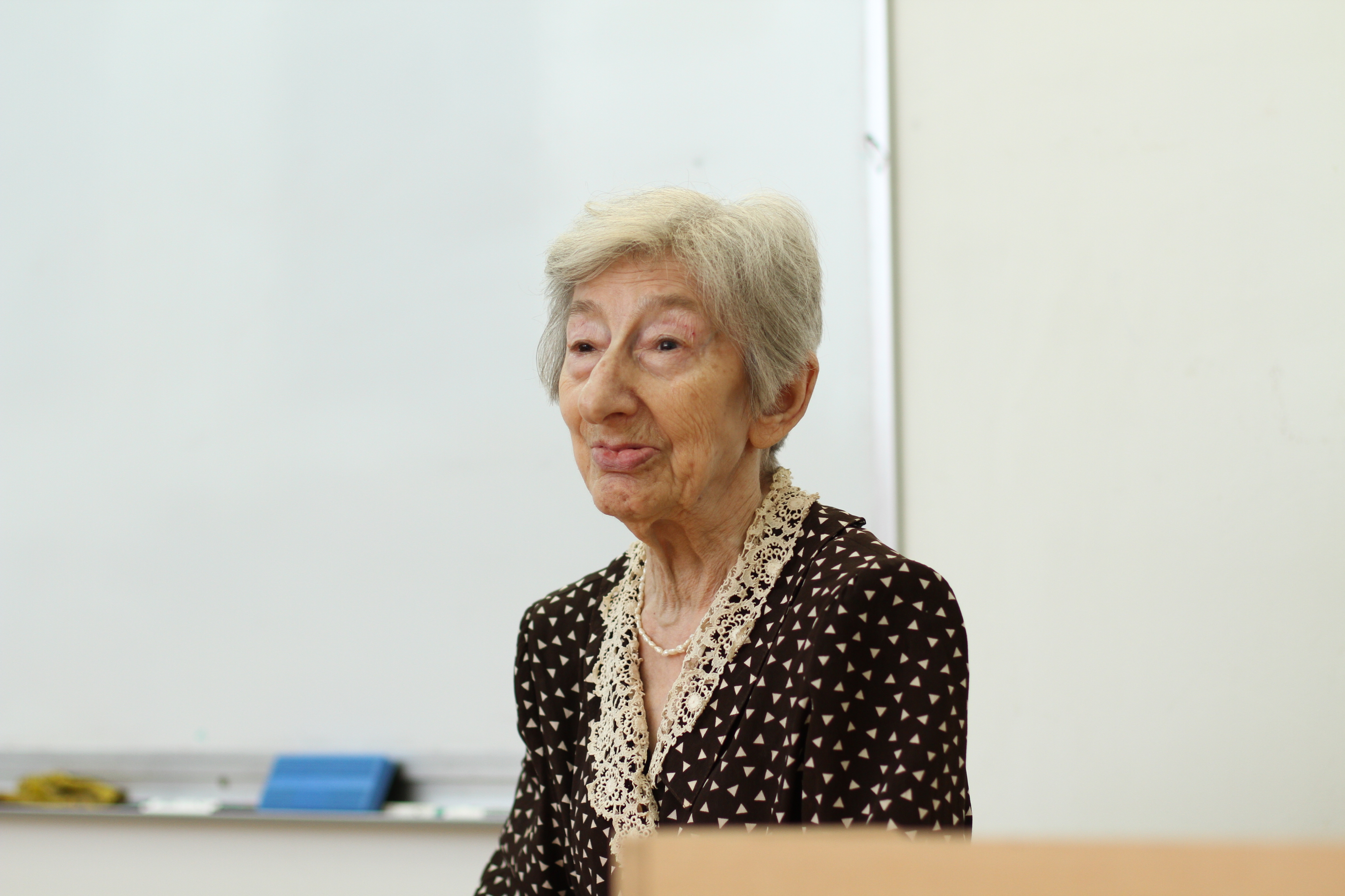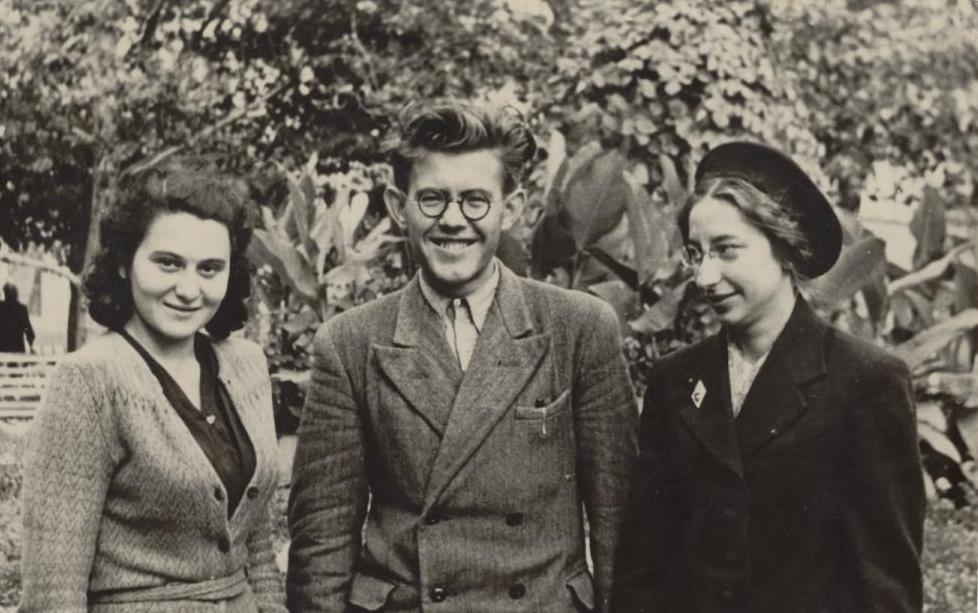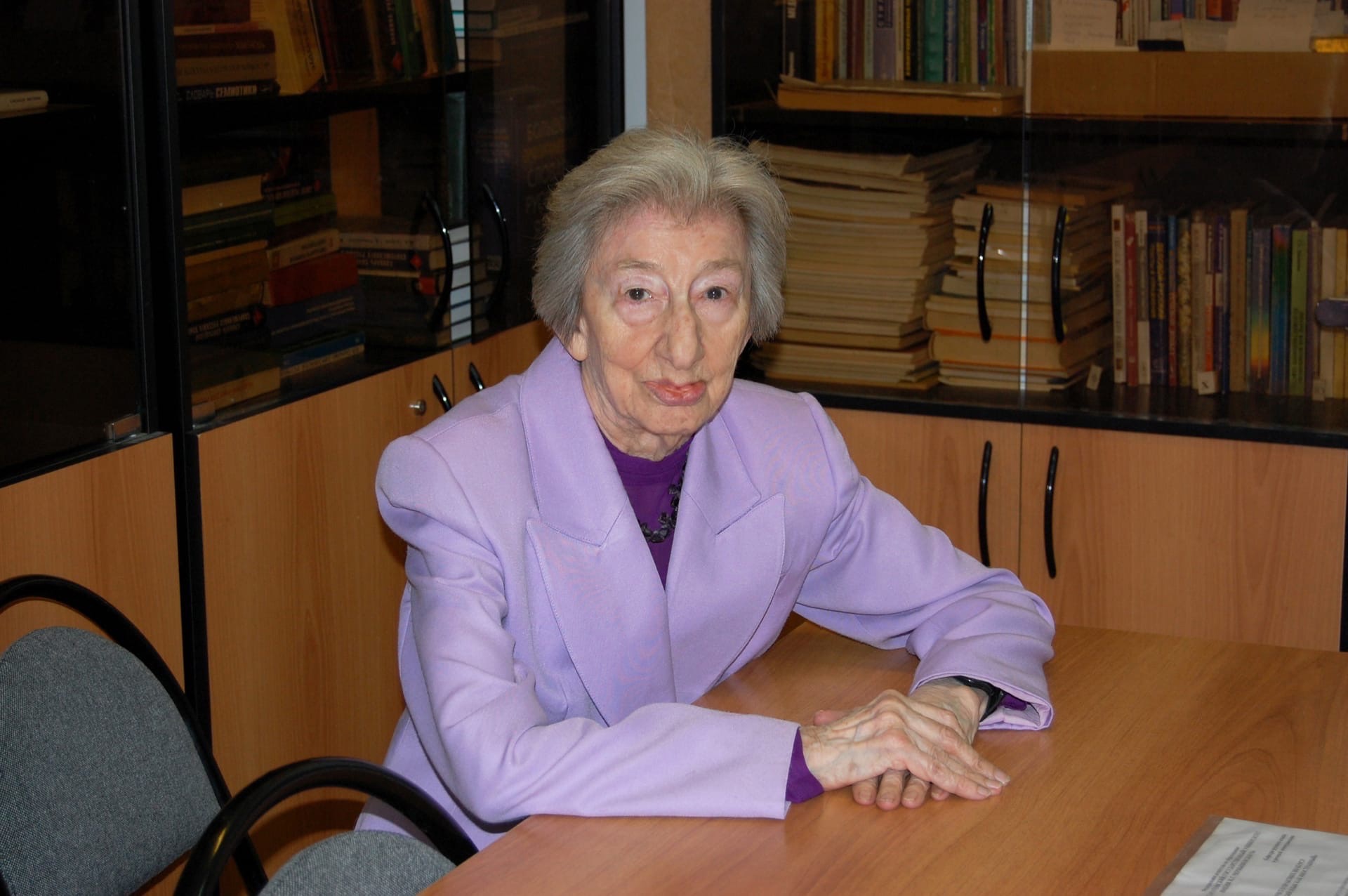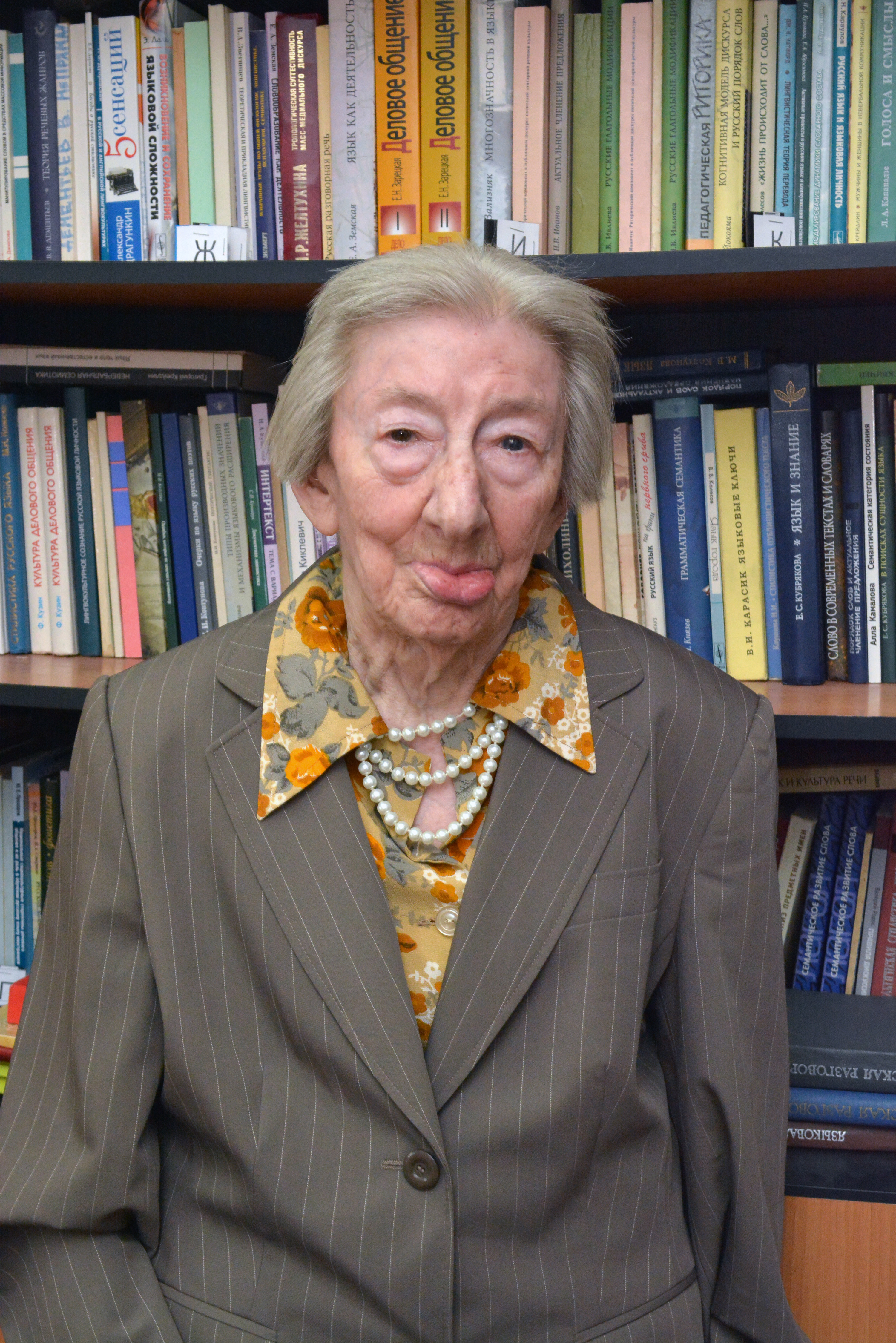
And also – of dialectology, phonetics, morphology and rhetoric. The list can be continued: Olga Sirotinina is a leading linguist known in many countries, she has already been working at Saratov State University for 74 years!
Olga Sirotinina is Doctor of Philology, Professor of the Department of Russian Language, Speech Communication, and Russian as a Foreign Language of the Institute of Philology and Journalism of Saratov University, Honoured Scientist of the Russian Federation, Honoured SSU Professor, Honourary Worker of Education, and was awarded the Medal of A.S. Pushkin and medals of many universities, the Badge of the Governor of Saratov Region, and the Order of Friendship.

Everything about her is unusual. Little, fragile, still laughing like a child, Olga Sirotinina, all her life, with amazing stubbornness and pressure, has tried to push the boundaries of the familiar, the ordinary – all that we call the “circle of life”. It is no coincidence that fellow philologists note iher “alienity”. In her life, starting from birth, there has been so many cases when she should not have survived that this game of roulette, it seems, has only added excitement to her, hardened her, and made her believe that a person is the master of his own destiny. These words were said by her mother when one day she literally pushed her out of the house, seriously ill, barely standing, to take exams in her 2nd year at university. It would seem, all of us have heard this phrase. But Olga Sirotinina has managed to make her the core of her whole life.
The doctors have sentenced her many times, and she has survived despite their catastrophic diagnoses (‘I’m used to sentences’). Even in her postgraduate years, she prepared herself for complete blindness, but still, in her own words, ‘uses her eyes’. It is hard to believe that a huge library, which completely occupies the apartment, was read... with a magnifying glass, and even lying down, because this way the eyes do not get very tired. She is also the author of more than 800 scientific publications. And she still demonstrates an example of creative longevity – recently under her editorship there was published a collective monography titled The Communication Efficiency: The Influence of Communication Spheres on the Factors of its Achievement.
Due to the health issues, Olga Sirotinina cannot stand for a long time, therefore, during lectures, when she was still reading them to the entire batch, she always walked around the audience. In general, it seems that for her there are no unsolvable life situations, which usually make us get into a panic and feel depressed. ‘My brain tends to observe, accumulate the collected material, analyse, generalise, and draw conclusions.’ She loves this process so much that any problems for her become nothing more than a natural life background. She studies them, explains them, and offers herself an effective algorithm of actions.
But before she realised that studying the processes which take place in the modern Russian language was exactly what she would like to do, she was going to enter the Theatre Department of the Russian Institute of Theatre Arts. She was so passionate about the theatre that she never missed a single performance of the Saratov Drama Theatre, she sat in the first row of the stalls (because she could not see anything further), in the 13th seat, with a pencil and a notebook on her knees and wrote down her impressions.
She fell in love with an actor, a prom-trotter. She wrote letters to him, but she expressed not her love in them love but analysed his acting, commented on incorrect speech, for example, errors in logical stress. As it turned out later, Alexander Stepanov kept her letters all his life...
The war dramatically changed all plans. The girl, who had been fond of theatre not so long ago, stayed in Saratov, entered the Faculty of Philology of the local university, since the high school certificate was, as they said then, with a “golden border”, and she did not have to take exams.
The novice philologist listened to lectures on ancient literature with pleasure and attentively listened to the courses of ancient Russian literature and folklore. She wrote to her father in a letter, ‘I like all this, but what will I do with such subjects as the Modern Russian and the Old Church Slavonic? This is horror and nightmare!’ Then the tone of the letters began to change. A little later, taking a postgraduate course, she knew and continued to study two foreign languages – English and French – and three Slavic ones – Ukrainian, Polish, and Serbian.
During the war, Leningrad University was evacuated to Saratov, and she was lucky enough to listen to lectures by remarkable world-famous scientists – literary scholars Grigory Gukovsky, Grigory Byaly, Boris Eikhenbaum, a historian Yevgeny Tarle, linguists Alexander Riftin and Maria Sokolova as well as the founder of the Saratov Philological School Alexander Skaftymov. It was they who then establish a new approach framework of university philological education. The main principle that she adopted and learned from them was that there should not be unanimity in solving scientific problems. And one more thing: there is no superfluous knowledge, as Alexander Skaftymov liked to repeat.
As many of her teachers, this natural “vaccination” later not only helped in life but often made it difficult. And yet, expressing and proving her point of view has become the norm for her.
The novice philologist listened to lectures on ancient literature with pleasure and attentively listened to the courses of ancient Russian literature and folklore. She wrote to her father in a letter, ‘I like all this, but what will I do with such subjects as the Modern Russian and the Old Church Slavonic? This is horror and nightmare!’ Then the tone of the letters began to change. A little later, taking a postgraduate course, she knew and continued to study two foreign languages – English and French – and three Slavic ones – Ukrainian, Polish, and Serbian.
During the war, Leningrad University was evacuated to Saratov, and she was lucky enough to listen to lectures by remarkable world-famous scientists – literary scholars Grigory Gukovsky, Grigory Byaly, Boris Eikhenbaum, a historian Yevgeny Tarle, linguists Alexander Riftin and Maria Sokolova as well as the founder of the Saratov Philological School Alexander Skaftymov. It was they who then establish a new approach framework of university philological education. The main principle that she adopted and learned from them was that there should not be unanimity in solving scientific problems. And one more thing: there is no superfluous knowledge, as Alexander Skaftymov liked to repeat.
As many of her teachers, this natural “vaccination” later not only helped in life but often made it difficult. And yet, expressing and proving her point of view has become the norm for her.

At the same time, she has always been a real workaholic. Thus, for ten years, she participated in dialectological expeditions, Olga Sirotinina has carried out countless experiments and urged her colleagues to listen again to colloquial speech! For reliable conclusions, she has considered it necessary to study the speech of different people, and there should be many of them. The results of these studies sometimes have been contrary to generally accepted theories, but she has always steadfastly held up well.
Once, at one of the Volga scientific conferences, she read a report on word order in a language in a section chaired by a respected scholar, an author of a textbook on syntax, Alexander Gvozdev. Trembling with fear, nevertheless she entered into an argument with him, citing numerous examples that violated the conclusions of the authoritative specialist. After the report, the discouraged chairman, not without irony, asked, ‘Isn’t it possible to somehow do something so that I am right, and not you?’ To which a firm response from Sirotinina followed, ‘No, it’s impossible.’ Later, however, he agreed with her and even admitted
Having lived for almost a century, she has managed to do take various scientific positions: for 20 years she headed the Department of the Russian Language, was the author and editor of The Issues of Stylistics and The Issues of Speech Communication research journals, many collective monographs, textbooks on the Russian language and the culture of speech. In 1995, in the struggle for the purity of Russian speech, the First Council on the Russian Language under the Russian President was established, and as its branches – the Institutes of the Russian Language. For the entire Volga region, Olga Sirotinina was appointed as the director of such an institute and a member of the Council under the President.
For many years, Olga Sirotinina has been working as deputy chair of the dissertation council. Personally, under her leadership, 58 candidate and 17 doctoral dissertations have been defended. She has always been an exclusive and sought-after specialist, she has taught courses at Kalmyk, Volgograd, Ivanovo, Samara, Chelyabinsk, Yakutsk, and other universities of the country by invitation. At one time, several thousand books from her library were taken to Volgograd University – it was a gift for the day of its opening.
Her scientific interests include not only dialects and colloquial speech but also textual problems, media language, and speech culture. She hosted The Russian Language Service show on local television and still does not part with a notebook where she writes down the passages of television or radio commentators. She is very worried that colloquial speech is crowding the standard one, that everything is mixed up and many speech flaws often become the norm. How many such notebooks she has handed over to her alma mater department hoping that future researchers would read, take into account, and defend something of their own, something new... Now, according to her, it is necessary, more than ever, to make the top-priority the following: the language system should expand and replenish!
Everybody is unique and has his or her own way
We talked with Olga Sirotinina for three hours. She sat on the edge of the sofa (since the most relevant books lay in piles on it, which are difficult to find in a huge library and which should always be at hand), and remained in the same position until the end of our meeting, demonstrating many years of bearing, endurance, and willingness to be helpful! Everything about her is unusual – the queen of linguistics and at the same time such a simple and accessible interlocutor.

– Olga Borisovna, why did you call your book of memoirs Nevertheless, I Am Alive?
– But there is also a subtitle, ‘or I am a happy person.’ I say this quite sincerely, I have always thought so, and confidence in this has helped me a lot. Every day.
– Who has had the greatest influence on you at the beginning of your research career?
– Alexander Mitrofanovich Lukyanenko, one of the founders of the Saratov Linguistic School, and, of course, Lidia Ivanovna Barannikova – it was she who aroused my interest in living speech and taught me to collect linguistic literature.
– Your doctoral dissertation was titled The Word Order in Russian. What depends on this order? How do you think modern native speakers understand this?
– I somehow read from Alexander Sergeyevich Pushkin (and this deeply rooted in me) that written and spoken Russian are two different languages. And to know only one of them is not to know the Russian language as a whole. So, I realised that I would be engaged in colloquial speech. Then it turns out that the word order in it is completely different and opens up many additional meanings and colours in the language.
– Together with your colleagues at the department, you have devoted a lot of energy to the fight against bureaucratic cluttered speech. You were a member of the Russian Language Council under the President. Even special manuals were published. Do you see the results of these efforts?
– Partially… I know one thing for sure: whoever wants to speak correctly, can easily learn how to do it. Including with the help of our manuals.
– In academic reference books, you are called the founder and head of the Saratov Linguistic School – what are its distinguishing features?
– The main thing is that nothing is adjusted to it, only facts are analysed. Our whole department was passionate about learning how the Russian language functioned in different styles. While we were working on styles, our linguistic school was formed. But each specialist in it is unique and, of course, goes his or her own way.

– Can you count how many generations of Saratov philologists have you studied?
– Depending on what is considered generations… I have been working at the university since 1948, I started teaching the history of the Russian language immediately after graduating from the postgraduate school – so, count! Only one example is close to me: my student, although we had only a five-year difference, was Galina Georgiyevna Polishchuk, who later became a professor and an outstanding philologist. Then I taught her daughter, now Doctor of Philology Elena Genrikhovna Elina and, finally, her daughter Marina.
– You still advise young language researchers a lot today. Who is following your path today, what are they like?
– Those who go in their research from facts to their generalisations and do not adjust the results of research to their opinion.
– Computerisation, e-books and your huge library - how do they get along with each other?
– They don't get along at all. My computer, eyes, and hands are now my daughter Tatyana. A physicist by education and vocation, she also mastered the skills of an editor of linguistic texts.
– Who are the iconic figures in linguistics for you today? Your opinion will be interesting to potential linguists.
– Tatyana Chernigovskaya, Vadim Dementiev, Victoria Krasnykh. Academician Viktor Vinogradov, Natalia Shvedova, Vitaly Kostomarov, who are no longer with us, are very significant now.
– You have many awards, which one do you consider the most valuable?
– The very first – Honoured Scientist of the Russian Federation.
– What are you most worried about right now?
– I always worry about the Russian language.
Text by: Tamara Korneva
Photos: Olga Sirotinina’s personal archive
Translated by: Lyudmila Yefremova







